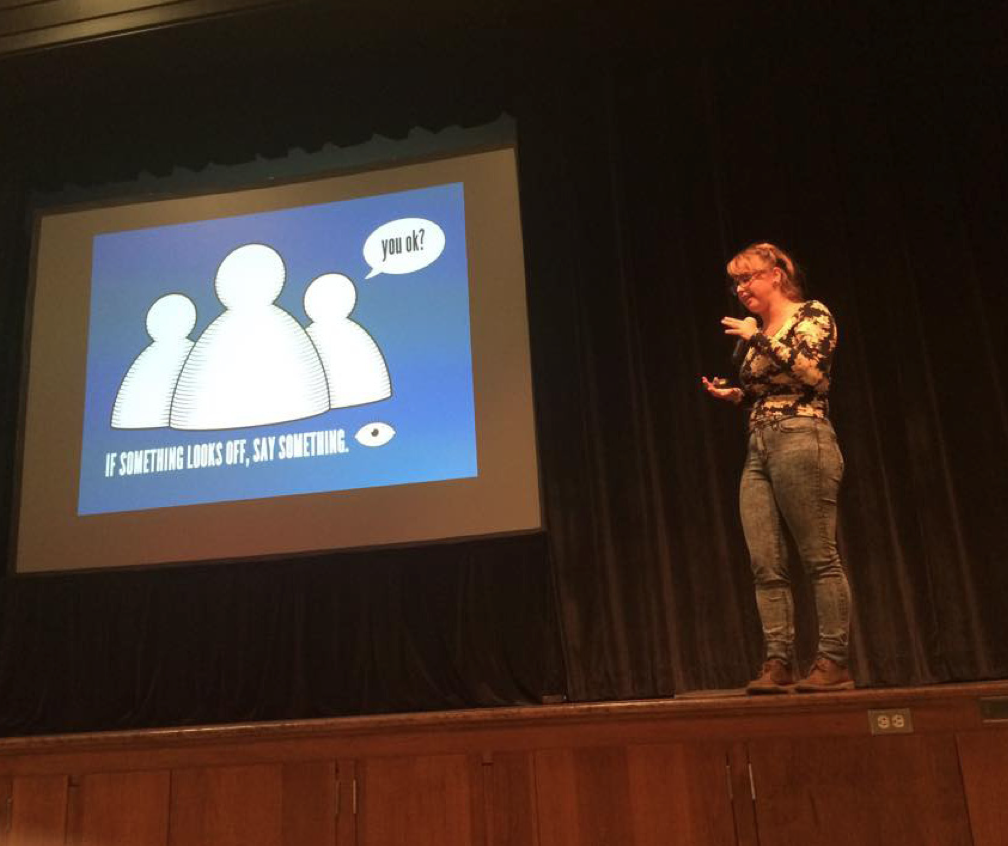Laci Green gives presentation about rape culture

Famous YouTuber and social activist Laci Green speaks to Gettysburg College students about rape culture and other gender/sex-related topics.
By Anika Jensen, Staff Writer
YouTube activist Laci Green delivered a compelling speech about rape culture in the CUB Wednesday, Oct. 1. Green addressed the causalities behind sexual assault and encouraged her audience to cultivate a culture of consent, challenge gender stereotypes, and take action.
In addition to having over one million subscribers on her YouTube channel Sex+, Laci Green is a trained crisis counselor and has studied sexuality and gender.
Using a variety of videos, statistics, and anecdotes to highlight the severity of rape culture, Green appealed to the emotional side of her audience and encouraged questions and participation.
She described the “gears” behind rape culture to be tolerance, gender roles, trivialization, and victim blaming, and illustrated the consequences of these factors.
To emphasize the prevalence of rape culture, Green told her audience that “more people will admit to having raped someone if they do not use the word ‘rape.’”
She also mentioned that 75 to 90 percent of sexual offenders remain on campus after they have assaulted someone, and are often allowed to remain on sports teams, in Greek life, and in other clubs. Green expressed her feelings on the matter by saying, “We need to fix this, you guys. This is not ok.”
The topic of gender roles was central to Green’s speech, which she attributed to being the cause of objectification and
slut shaming. She showed her audience photographs of rape victims describing what their attackers had said to them, and compared them to lyrics of the song “Blurred Lines,” which matched up almost exactly.
Green said that songs like “Blurred Lines” are “sexualizing the idea of pushing boundaries,” and likewise played a parody video, in which men were portrayed as sexualized objects while a female singer played the dominant role.
This parody video drew laughter from the CUB ballroom, until a member of the audience said that it was just as bad to laugh at men for being sexualized because it still contributed to rape culture.
Green also spoke about slut shaming and victim blaming, especially with the involvement of alcohol. She said that women are taught to avoid rape and sexual assault, but “when it happens anyway, the woman is shamed and blamed for it.”
Green also argued that rape has occurred as long as humans have existed, and therefore the way a person dresses today should not be an invitation or incentive for rape. “Is rape a 2000’s invention?” she asked. “No.”
One of the most interested and thought-provoking visuals Green used was a video depicting sexism in Disney films, where women are portrayed as weak sexual objects and male characters are strong and have dominance over them.
Green also spoke about male rape and sexual assault, and the idea that men are told they should be strong enough to fight off their attackers. “Men are hyperseuxualized to the point where people think they can’t be raped,” Green said, “But they can.”
Drawing applause from the audience was a student who commented that people needed to stop speaking about gender like there are only men and women.
To conclude, Green gave the audience tasks to help end rape culture: to push for the idea that consent can only be given in a sober verbal yes; to challenge stereotypes about gender; to speak out and push for legal changes; and to use their voices. She gave one last example about an art student at Columbia who carried around the mattress on which she had been raped to fight for an end to rape culture. Green: “This is what you need to be doing.”
